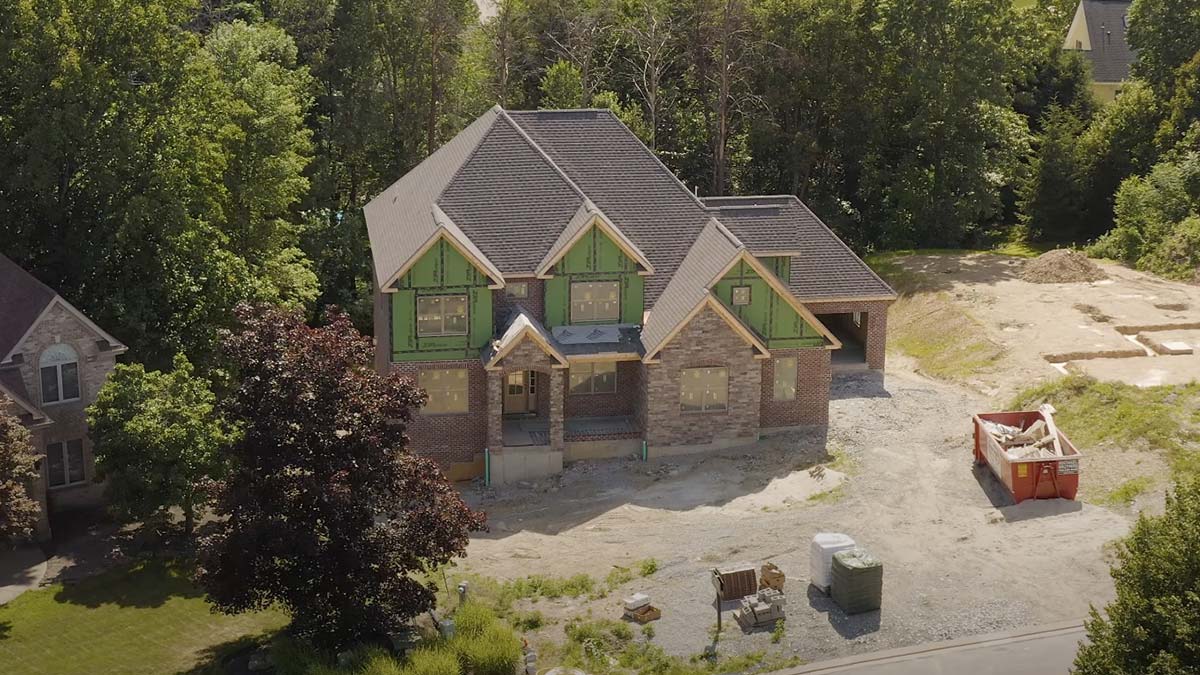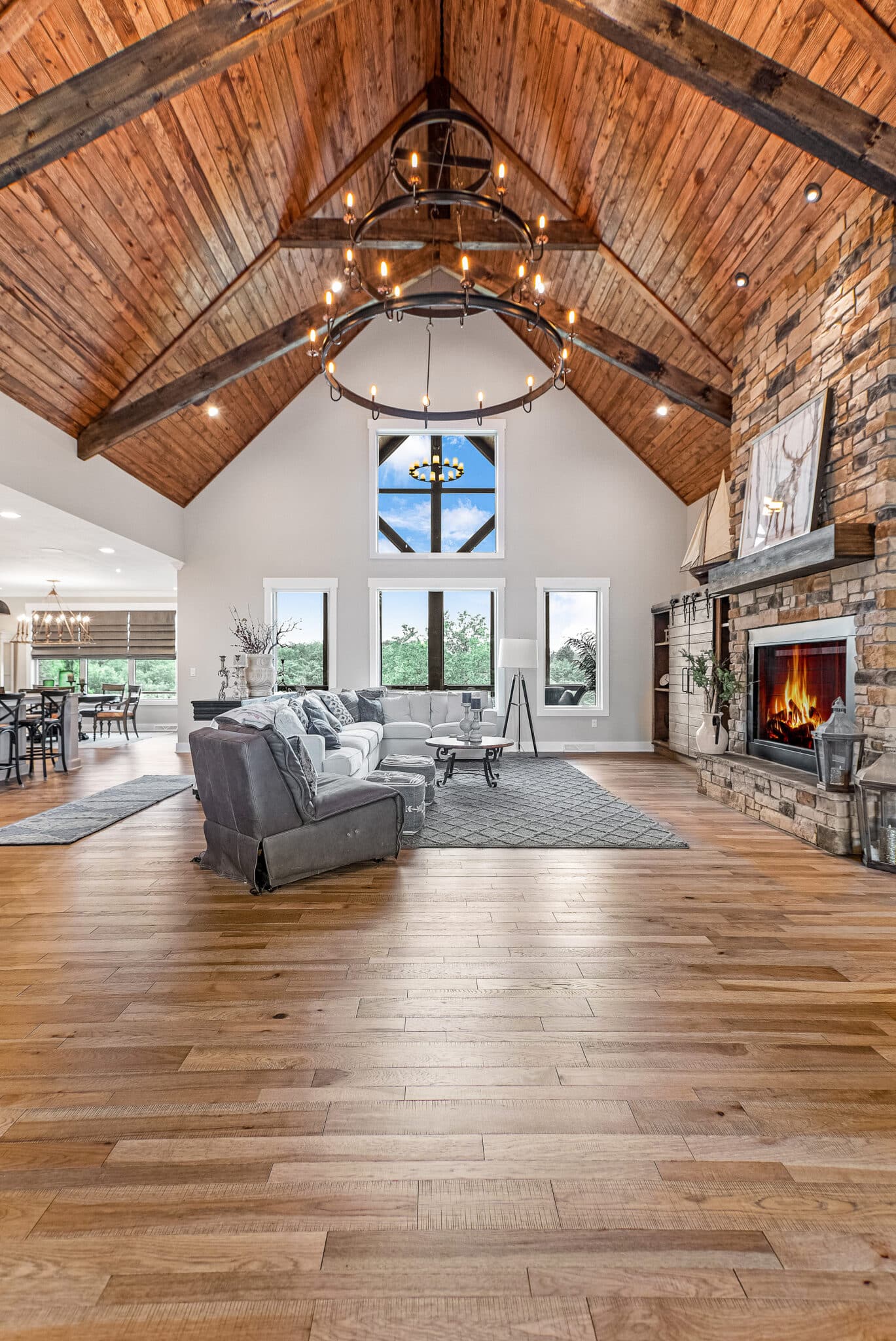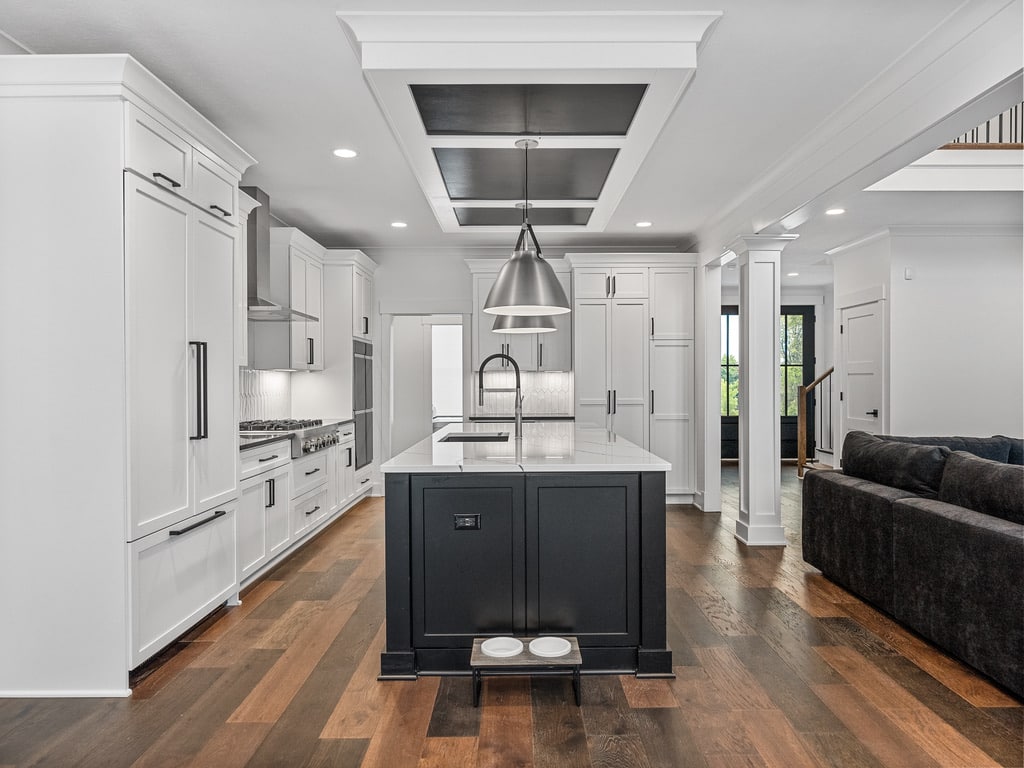Buying land is a big step—but it’s not the finish line. Just because you own a lot doesn’t mean it’s ready for a custom home.
At Costa Homebuilders, we’ve helped hundreds of clients take raw land and turn it into move-in-ready luxury homes across Western Pennsylvania. The first question many of them ask is the right one: “Can I build a house on my land?”
Building a home on your land involves careful planning and consideration. From selecting the perfect site to choosing the right builder, we provide guidance and detailed advice to help you navigate this journey effectively. Here’s how we help you answer that—clearly, realistically, and before you spend time designing a home that may not work.
Introduction to Building a Custom Home
Building a custom home on your own land can be an exciting journey, but it requires careful planning and consideration of various factors. The construction process involves several stages, from buying land to obtaining necessary permits and ensuring compliance with local building codes. A custom home project allows you to have control over the design, layout, and features of your dream home, making it essential to work with a reputable home builder who has local knowledge and experience in building custom homes. By understanding the home building process and taking the right steps, you can ensure a smooth construction process and create a beautiful, functional, and sustainable home that meets your needs and budget.
Start With a Feasibility Check
Before you start picking out floor plans or finishes, you need to know whether your lot can legally and logistically support the kind of home you want. This starts with five key areas:
It’s important to understand the basic steps necessary for buying land and constructing a house, which include site evaluation, securing financing, obtaining permits, and planning the construction timeline.
1. Zoning and Property Restrictions
Is your lot zoned for residential construction?
- Are there setback rules that limit where you can place the house?
- What’s the maximum building height or footprint allowed?
- Are there deed restrictions or HOA rules?
Zoning affects everything from home size to location. At Costa, we check this as step one to ensure you are on the right path in the home building process.
2. Topography and Soil Conditions
The slope of your land and what’s beneath the surface can dramatically impact construction.
- Flat lots may seem simple but can have drainage issues
- Steep lots could require retaining walls, additional excavation, or custom foundations
- Rocky or loose soil and coal mines can increase foundation costs or limit basement options
Considering these important details can help avoid significant issues during construction, such as legal or zoning problems.
We often recommend soil testing and site grading analysis before finalizing plans.
3. Utility Access
If your lot isn’t already connected to utilities, you’ll need a plan—and budget—for them. It is also crucial to assess whether the lot can support a septic system, especially in rural areas.
We evaluate:
- Has the property passed a percolation test. (perc test)
- Public water and sewer access (or well and septic systems)
- Gas, electric, and broadband options
- Distance to the nearest main line and trenching requirements
In rural areas, the cost of bringing in utilities can surprise first-time landowners. We make sure it’s not a surprise for you.
4. Driveway and Access Requirements
You need legal, safe access to your land—and enough frontage to build.
- Shared driveways or private roads can involve easements or maintenance agreements
- Narrow or sloped access points may require grading or retaining
- Townships often have rules for emergency vehicle access, snow clearance, and drainage
- Is a Highway Occupancy Permit needed.
We walk your site to assess whether your access meets code and local zoning rules—and how to fix it if it doesn’t.
5. Environmental and Regulatory Considerations
Before building, you’ll need to verify:
- If you’re in a floodplain
- If any wetlands or protected zones exist
- Whether the lot falls under stormwater management regulations
- Whether tree removal requires permits
Additionally, it’s important to consider the environmental impact when verifying these factors to ensure the use of eco-friendly materials and minimize negative effects on the environment.
Costa’s team handles these checks so you don’t find out the hard way after breaking ground.
Budgeting for Lot Prep and Construction
A common mistake is budgeting for the house—without accounting for site work. That’s why Costa helps clients evaluate the total cost to build early.
That includes:
- Land clearing and tree removal
- Grading and excavation
- Utility installation
- Permit fees and engineering
- Foundation type (crawl, basement, slab)
Planning for unexpected expenses during the construction process is crucial to prevent financial surprises and setbacks.
We also guide you through the construction loan process and help build in contingency for the unexpected—because surprises are more expensive when you don’t plan for them.
Obtaining Necessary Permits
Before beginning construction, it’s essential to obtain the necessary permits and approvals from local authorities. This includes building permits, zoning permits, and environmental permits, which ensure that your custom home complies with local building codes, zoning laws, and environmental regulations. A home builder can guide you through the permit process, helping you navigate the complexities of local regulations and ensuring that your project stays on track. Additionally, it’s crucial to consider factors such as property taxes, utility bills, and resale value when planning your custom home project. By obtaining the necessary permits and approvals, you can avoid unexpected costs and delays, ensuring a successful and stress-free construction process.
Designing the Right Home for the Land You Own
A great lot still needs a smart design. At Costa, we don’t force your site to match a generic floor plan—we create a custom plan that fits your land and your lifestyle. Having a finalized home design is crucial to get accurate cost estimates and proceed with the building contract.
We consider:
- Where the sun hits in the morning and evening
- How to capture views and block unwanted ones
- How rainwater flows off the lot
- Where the driveway will enter and how traffic will move
By anchoring design to the land, we make sure your home looks good—and lives even better.
Preparing the Construction Site
Preparing the construction site is a critical step in the home building process. This involves clearing the land, removing trees and debris, and grading the site to ensure it’s level and compact. A home builder can help you assess the site and determine the necessary site work, including excavation, fill, and compaction. It’s also essential to consider factors such as water flow, drainage, and flood zones when preparing the construction site. By taking the time to properly prepare the site, you can ensure a stable and secure foundation for your custom home, preventing unforeseen costs and ensuring a smooth construction process.
Choosing a Builder Who Knows How to Build on Raw Land
Not every builder handles lot builds the same way. Some avoid them entirely. Others charge inflated fees because of the unknowns or under bids the site work to get the job which unfortunately causes trust issues before the designs are even finalized. Choosing the right builder is crucial for successfully realizing your home-building vision. Look for a builder who can provide references, has a proven track record, and is committed to creating meaningful living spaces.
Here’s what to look for:
- Local permitting experience—every township has different rules
- Site planning knowledge—not just construction, but grading and infrastructure
- Transparent budgeting—line-item clarity from excavation to final inspection
- Proven track record—homes built on raw land in a variety of settings
Costa Homebuilders has decades of experience turning raw lots into custom homes across South Hills, North Hills, Washington County, Cranberry Township, and the entire Pittsburgh area.
Ensuring Quality and Compliance
Ensuring quality and compliance is crucial throughout the construction process. This involves working with a reputable home builder who has experience in building custom homes and is familiar with local building codes and regulations. A home builder can help you navigate the complexities of the construction process, ensuring that your custom home meets the highest standards of quality and compliance. This includes conducting regular inspections, testing, and quality control measures to ensure that your home is built to last. By prioritizing quality and compliance, you can create a beautiful, functional, and sustainable home that meets your needs and budget, while also ensuring a smoother construction process.
What to Expect During Construction
Once your site is cleared and your plans are approved, we move into full construction mode.
Costa’s approach includes:
- A clear project schedule
- Regular site updates and walkthroughs
- Seamless management of trades, vendors, and inspections
- Quality control at every phase—from foundation to final paint touch-up
To ensure a successful home construction project, it is crucial to stay informed through regular communication with your builder, allowing for timely decision-making and intervention.
We also handle your occupancy certificate and final utility connections—so you’re not chasing paperwork after your home is done.

Already Own Land? Here's What to Do Next
If you’ve already bought a lot—or are under contract—we recommend scheduling a site evaluation. It’s a no-pressure walkthrough where we look at:
- Zoning and buildability
- Utility feasibility
- Topography and drainage
- Cost considerations
- Design opportunities based on the site’s strengths
We’ll tell you what’s possible, what’s not, and how to make the most of your land. Selecting the perfect parcel of land is a critical first step in the home building process, as it significantly impacts the overall quality and experience of crafting your dream home.
Can You Build a House on Your Land? Yes—With the Right Plan
Owning land opens the door to real customization—but only if you handle the first steps right.
Building a house on your land is an exciting opportunity, particularly for first-time builders who may feel overwhelmed by the process. Costa Homebuilders helps you move from “Can I build a house on my land?” to “Let’s build something amazing here.” We guide the process from lot to layout to finished home—with no guesswork along the way.
Ready to see if your land is buildable? Let’s walk it together. Contact us today and get started the smart way.



